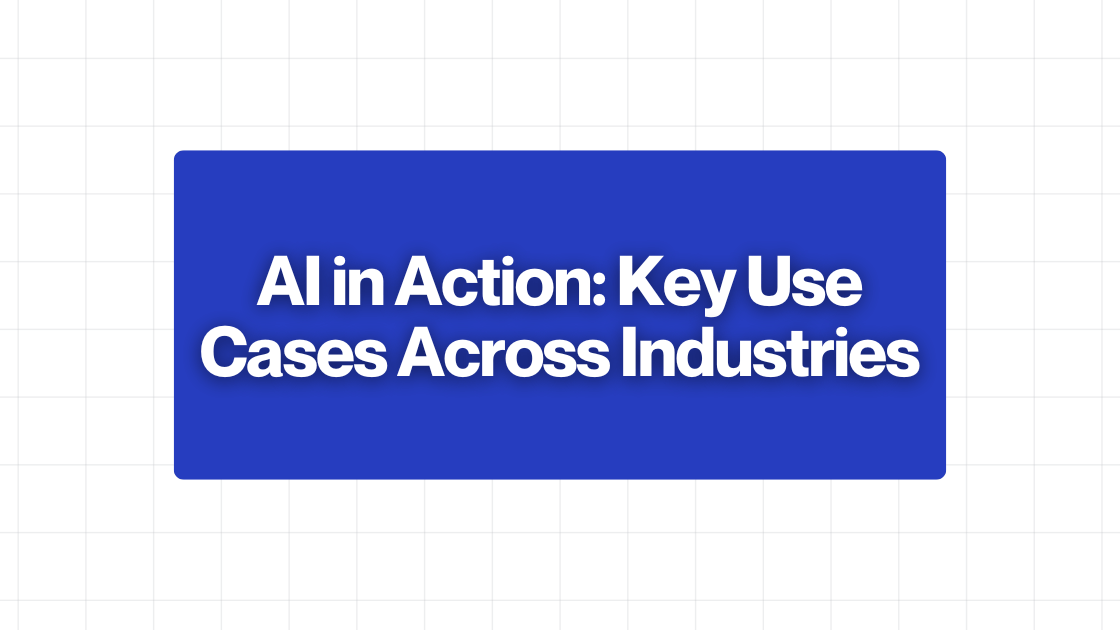AI in Action: Key Use Cases Across Industries
AI is no longer confined to research labs or tech startups—it’s transforming industries across the globe. Here’s how organizations are putting AI to work today.

AI is no longer confined to research labs or tech startups—it’s transforming industries across the globe. From retail to healthcare, businesses are leveraging AI to solve complex problems, streamline operations, and unlock new growth opportunities. Here’s how organizations are putting AI to work today:
Customer Experience Transformation
AI is revolutionizing how companies interact with their customers by making experiences more personalized and seamless:
- Chatbots and Virtual Assistants: Companies like Amazon and Netflix use AI-powered assistants to engage users in real-time, offering tailored recommendations and quick support for inquiries.
- Voice Recognition: AI-driven voice assistants, such as Siri or Alexa, are enhancing how customers interact with technology, streamlining queries and purchase processes.
- Dynamic Pricing Models: Retailers use AI to analyze market trends, customer behavior, and competitor pricing to offer optimal pricing that maximizes revenue while meeting consumer demand.
Operational Efficiency
Organizations are using AI to boost productivity and reduce operational costs across industries:
- Predictive Maintenance: Manufacturing companies deploy AI models to predict equipment failures, reducing downtime and maintenance costs.
- Supply Chain Optimization: AI-driven forecasting helps retailers like Walmart anticipate demand surges, ensuring the right products are available without overstocking.
- Inventory Management: AI tools monitor stock levels, reducing wastage and optimizing warehouse layouts for smoother operations.
IT Operations (AIOps)
AI is transforming how IT teams operate by automating processes and providing deeper insights:
- Incident Management: AIOps tools automatically identify, prioritize, and resolve system issues, significantly reducing downtime.
- Capacity Planning: AI predicts future resource demands, enabling IT teams to allocate resources efficiently while avoiding over-provisioning.
- Security Enhancements: AI models detect anomalies in real-time, identifying potential cyber threats and strengthening organizational security.
Marketing and Sales Enhancements
AI is driving smarter, more targeted marketing and improving sales operations:
- Predictive Lead Scoring: Sales teams use AI to identify high-value leads, focusing their efforts on the most promising opportunities.
- Content Personalization: Marketing teams leverage AI to create customized email campaigns and product recommendations, boosting engagement and conversion rates.
- Customer Journey Mapping: AI tools analyze customer interactions to predict behavior and optimize touchpoints, resulting in a more cohesive user experience.
Workforce Productivity
Generative AI tools are empowering employees to work more effectively by automating repetitive tasks and enhancing creativity:
- Content Creation: AI tools like ChatGPT or Jasper assist in writing blogs, social media posts, and reports, freeing up employees for strategic work.
- Data Analysis: AI simplifies complex data analysis, providing actionable insights that inform better decision-making.
- Employee Training: AI-powered training platforms personalize learning paths, accelerating skill development and ensuring teams remain competitive.
Healthcare Advancements
AI is making significant strides in improving healthcare outcomes:
- Early Detection: AI models like IBM Watson assist doctors in diagnosing diseases such as cancer and heart conditions with higher accuracy.
- Telemedicine: AI chatbots and diagnostic tools support virtual consultations, making healthcare more accessible.
- Drug Discovery: Pharma companies use AI to accelerate the identification of promising compounds, reducing the time and cost of drug development.
Finance and Risk Management
AI is redefining the financial industry by optimizing operations and minimizing risks:
- Fraud Detection: Financial institutions deploy AI models to analyze transaction patterns, flagging suspicious activities in real-time.
- Credit Scoring: AI enhances the accuracy of credit risk assessments, providing fairer and more inclusive evaluations.
- Algorithmic Trading: Investment firms use AI to identify trading opportunities, maximizing profits while minimizing risks.
Legal and Compliance Support
AI is streamlining labor-intensive tasks in legal and compliance fields:
- Contract Analysis: AI tools review legal documents, highlighting discrepancies and ensuring compliance with regulatory requirements.
- Regulatory Monitoring: AI monitors changes in laws and regulations, alerting companies to updates that require action.
- Document Management: Large repositories of legal documents are made searchable and accessible through AI, improving efficiency in case preparation.
Add Guardrails For Your AI
Deliver leading AI assistants and implement your AI use policies.

.png)
